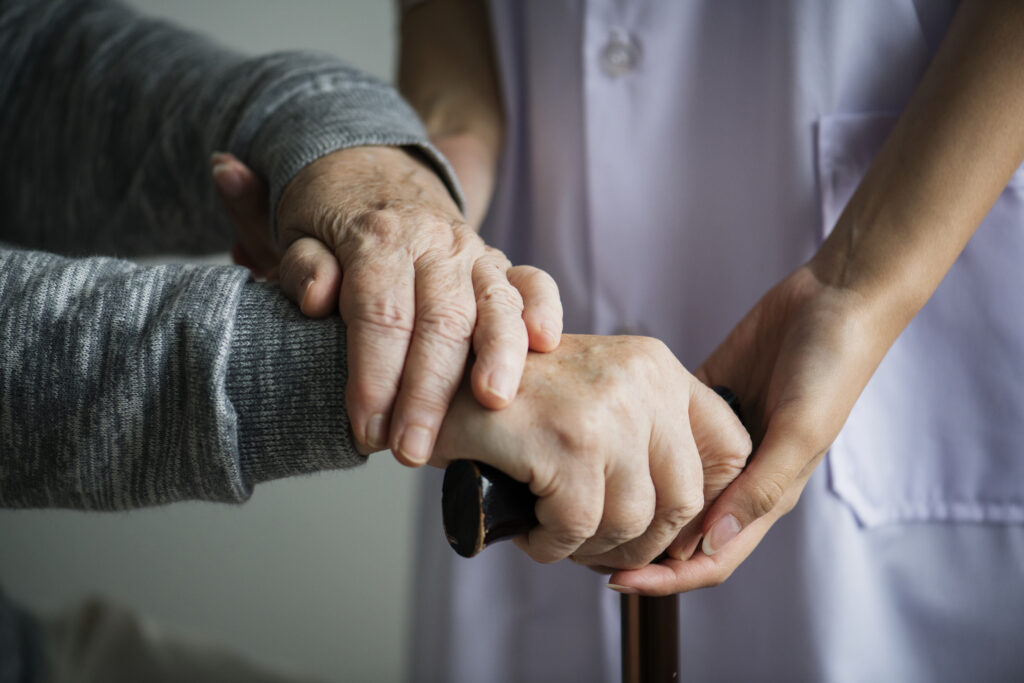
Learn how to effectively care for someone with Alzheimer’s disease with this comprehensive Alzheimers care guide.
Understanding Alzheimer’s Disease
Alzheimer’s Disease is a progressive brain disorder that affects memory, thinking, and behavior. It is the most common cause of dementia, a general term for a decline in cognitive ability severe enough to interfere with daily life. The exact cause of Alzheimer’s disease is still unknown, but it is believed to be a combination of genetic, environmental, and lifestyle factors.
As a caregiver, it is important to understand the symptoms and progression of Alzheimer’s disease. Memory loss, confusion, difficulty with language and communication, changes in mood and behavior, and challenges with reasoning and problem-solving are common symptoms. The disease typically progresses in stages, starting with mild memory loss and eventually leading to severe cognitive decline.
By understanding Alzheimer’s disease, you can better anticipate and respond to the needs of the person you are caring for. It is important to approach the person with empathy, patience, and understanding, as they may become frustrated or agitated due to their cognitive decline.
Creating a Safe Environment
Creating a safe environment is essential when caring for someone with Alzheimer’s disease. The person may become disoriented or confused, increasing their risk of accidents or injuries. Here are some tips for creating a safe environment:
– Remove tripping hazards such as loose rugs and clutter.
– Install grab bars and handrails in bathrooms and stairways.
– Keep walkways well-lit and free from obstacles.
– Lock cabinets containing hazardous items such as cleaning products and medications.
– Install door locks or alarms to prevent wandering.
By creating a safe environment, you can minimize the risk of accidents and provide a secure space for the person with Alzheimer’s disease.
Establishing Daily Routines
Establishing daily routines can help provide structure and familiarity for someone with Alzheimer’s disease. It can reduce confusion and anxiety, and make daily activities more manageable. Here are some tips for establishing daily routines:
– Stick to a consistent schedule for meals, medication, and activities.
– Break tasks into smaller, manageable steps.
– Use visual cues such as calendars and clocks to help the person understand the passage of time.
– Allow for flexibility and adaptability in the routine, as the person’s needs may change.
By establishing daily routines, you can provide a sense of stability and predictability for the person with Alzheimer’s disease.
Effective Communication Strategies
Effective communication is crucial when caring for someone with Alzheimer’s disease. As the disease progresses, the person may have difficulty expressing their thoughts and understanding others. Here are some strategies for effective communication:
– Use simple and clear language, speaking slowly and calmly.
– Ask one question or give one instruction at a time.
– Use visual aids such as gestures and facial expressions to support verbal communication.
– Be patient and give the person time to respond.
– Avoid correcting or arguing with the person, as it can cause frustration and agitation.
By using effective communication strategies, you can enhance understanding and reduce communication barriers.

Supporting Emotional Well-being
Caring for someone with Alzheimer’s disease can be emotionally challenging for both the caregiver and the person with the disease. It is important to prioritize emotional well-being and provide support. Here are some ways to support emotional well-being:
– Show empathy and understanding.
– Provide reassurance and comfort.
– Engage in activities that the person enjoys and find meaningful.
– Encourage social interaction and maintain connections with family and friends.
– Seek support from support groups or professional counselors.
By supporting emotional well-being, you can improve the quality of life for both the caregiver and the person with Alzheimer’s disease.
How Nurse for Care caregivers will help you?
Nurse for Care caregivers are trained professionals who specialize in providing care for individuals with Alzheimer’s disease. They have the knowledge and expertise to effectively manage the unique challenges associated with the disease. Here are some ways Nurse for Care caregivers can help you:
– Assist with daily activities such as bathing, dressing, and grooming.
– Provide medication reminders and ensure medication adherence.
– Create a safe environment and prevent accidents or injuries.
– Engage the person in stimulating activities to promote cognitive function.
– Offer emotional support and companionship.
By enlisting the help of Nurse for Care caregivers, you can ensure that your loved one receives the highest quality of care and support throughout their Alzheimer’s journey. To learn more about our services and how we can support you, please visit our website at www.nurseforcare.com. If you’re confused on which caring service would be suitable for you, you may book a free caring consultation with our experts or you may check our guide to choose between Assisted Living or Home Care Services. You can also reach out to us directly at 647-921-9849 to discuss your specific requirements and schedule a consultation. We are here to provide the highest quality of care, tailored to your unique needs and preferences.
















T.co
Please let me know if you’re looking for a writer for your
weblog. You have some really good articles and I believe I would be a good asset.
If you ever want to take some of the load off, I’d love
to write some articles for your blog in exchange for a link back
to mine. Please send me an e-mail if interested.
Cheers!
My web-site :: nordvpn coupons inspiresensation (T.co)
Nordvpn Coupons Inspiresensation
Do you have any video of that? I’d like to find out some additional information.
My web-site … Nordvpn Coupons Inspiresensation
s.bea.sh
Pretty! This was an extremely wonderful article. Thanks for supplying this info.
my homepage nordvpn coupons inspiresensation (s.bea.sh)
t.co
Quality articles is the main to interest the users to pay a quick visit the website, that’s what this web page
is providing.
Also visit my blog post; nordvpn coupons inspiresensation (t.co)
DonaldSop
Norma ISO 10816
Dispositivos de ajuste: fundamental para el rendimiento uniforme y efectivo de las máquinas.
En el ámbito de la innovación contemporánea, donde la eficiencia y la estabilidad del dispositivo son de suma relevancia, los sistemas de ajuste desempeñan un rol fundamental. Estos equipos dedicados están concebidos para ajustar y estabilizar piezas rotativas, ya sea en maquinaria manufacturera, vehículos de transporte o incluso en equipos domésticos.
Para los técnicos en reparación de equipos y los técnicos, trabajar con aparatos de ajuste es crucial para garantizar el operación suave y estable de cualquier aparato rotativo. Gracias a estas alternativas avanzadas modernas, es posible limitar significativamente las oscilaciones, el ruido y la tensión sobre los soportes, aumentando la duración de partes importantes.
También relevante es el tarea que cumplen los dispositivos de ajuste en la servicio al usuario. El ayuda experto y el mantenimiento constante utilizando estos dispositivos posibilitan dar soluciones de óptima calidad, aumentando la bienestar de los usuarios.
Para los titulares de empresas, la inversión en unidades de balanceo y medidores puede ser esencial para optimizar la efectividad y productividad de sus aparatos. Esto es particularmente significativo para los emprendedores que manejan pequeñas y pequeñas emprendimientos, donde cada punto vale.
También, los equipos de ajuste tienen una amplia uso en el ámbito de la protección y el control de calidad. Posibilitan encontrar probables fallos, previniendo mantenimientos costosas y perjuicios a los aparatos. También, los resultados extraídos de estos sistemas pueden usarse para perfeccionar procedimientos y potenciar la visibilidad en motores de investigación.
Las zonas de utilización de los dispositivos de balanceo abarcan diversas industrias, desde la manufactura de vehículos de dos ruedas hasta el seguimiento del medio ambiente. No importa si se refiere de importantes producciones industriales o limitados espacios caseros, los equipos de balanceo son necesarios para asegurar un funcionamiento eficiente y sin detenciones.
eharmony special coupon Code 2025
Hi, this weekend is good designed for me, because this
point in time i am reading this impressive informative paragraph here at my
residence.
Here is my page: eharmony special coupon Code 2025
vpn
Hello, its pleasant paragraph concerning media print, we all know media
is a impressive source of information.
Look into my web-site: vpn
https://tinyurl.com/23ww4xyv
Please let me know if you’re looking for a writer for your blog.
You have some really good articles and I believe I would be a
good asset. If you ever want to take some of the load off, I’d absolutely
love to write some articles for your blog in exchange for a link back to mine.
Please blast me an e-mail if interested. Cheers!
https://tinyurl.com/28wjzmw4 gamefly 3 month free trial
https://tinyurl.com/2c2rno87
Yes! Finally someone writes about what is a vpn. https://tinyurl.com/2xsenm6a what is vpn
Vpn
I just couldn’t depart your website before suggesting that I really enjoyed the
standard info a person provide on your visitors? Is
going to be back frequently to investigate cross-check new posts